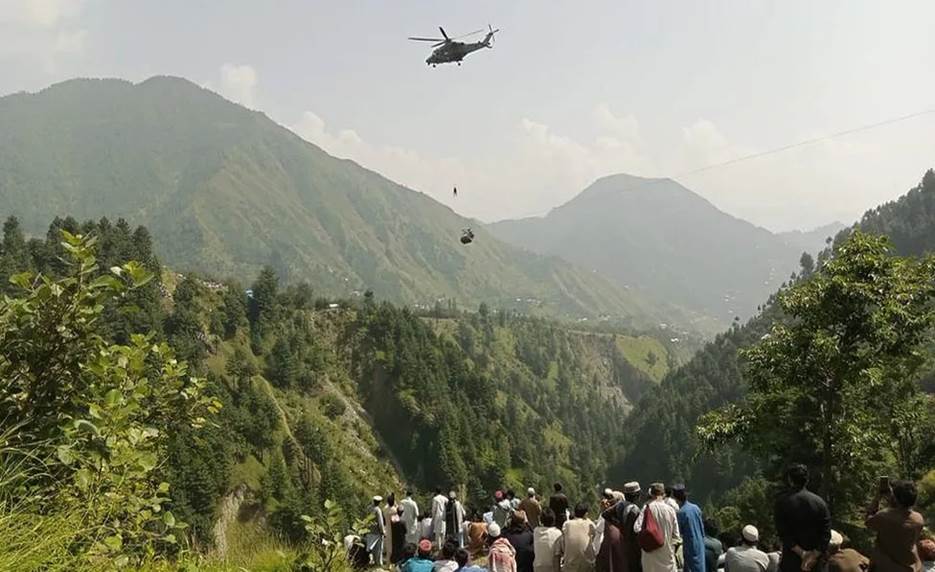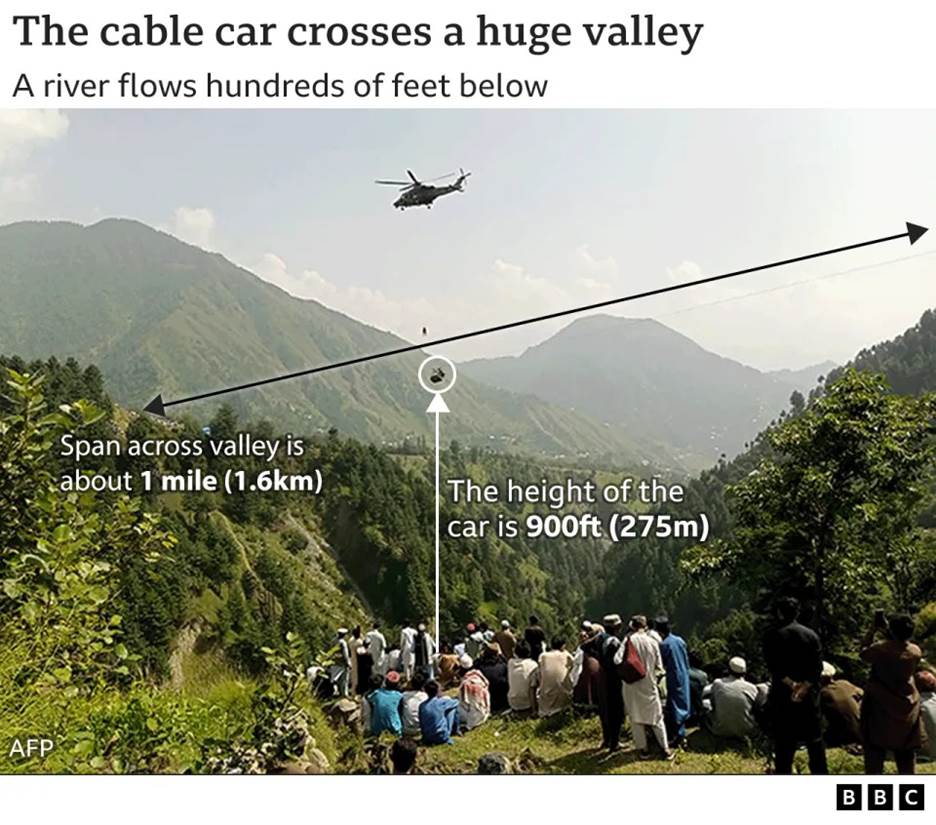
Residents used loudspeakers to alert officials to the mishap, but it took at least four hours for the first rescue helicopter to arrive
Pakistan Cable Car: From Panic to Relief, Survivors Recall Harrowing Ordeal
By Azizullah Khan, Farhat Javed & Kelly Ng - in Battagram, Islamabad and Singapore
It started out as a routine Tuesday morning. Car mechanic Gulfaraz had planned to accompany his nephew to school and then go home.
They made the journey as they had done for years - on a makeshift cable car that would take them across the steep Allai valley in the northwest of Pakistan.
But minutes into their ride, two cables supporting their car snapped.
They were trapped in the car with six other passengers, dangling hundreds of meters above the ground, buffeted by gusty winds.
"It felt like we were standing right at the edge of our own graves," Gulfaraz, 20, told BBC Urdu the next day. "We had little to no hope that we could be saved."
The cable wires snapped at about 07:30 local time (02:30 GMT), but it was not until 14 hours later that all eight people - six teenagers among them - were pulled to safety in a complex operation involving at least four helicopters and a team of zip wire experts.
Many of the trapped passengers did not think they would survive.
"I thought it was my last day and I will be no more," one of the rescued boys, Attaullah Shah, told AFP.
"God has granted me a second life," the 15-year-old said.
Cable chair lifts are often used for commuting in this area, deep in the mountains of the Khyber-Pakhtunkhwa province.
For students, the cable cars cut a two-hour road journey through mountainous terrain – from their village homes in Jhangra to school in Batangi – to just five minutes.
It was Gulfaraz who raised the alarm on Tuesday morning. Suspended in the air, he used his mobile phone to inform his family and friends about what had happened.
Residents used loudspeakers to alert officials, but it took at least four hours for the first rescue helicopter to arrive.
Hanging by a thread
It was a delicate operation for the choppers. They could not approach the cable car too closely, fearing their rotor blades might destabilize it further.
Each time a rescuer was lowered towards the car, it would shake, leading the children to scream in fear, eyewitnesses told local media.
Recalling the agony of the situation, Gulfaraz said: “Once when the helicopter came close to rescue the kids, the rescuer’s rope got stuck with the cable car.
“And it started swaying with the helicopter, we toppled upside down, the ones who were sitting fell off their seats, the ones who were standing fell down.
“I was really stressed out myself and I had to take care of the kids too. They were very scared, some were screaming, others were crying,” he said.
A child said to have a heart condition had fainted, he added.
Drone footage obtained by the BBC shows passengers piled on top of one another, clinging to their seats, many looking visibly distressed. The car was suspended lopsidedly with its doors flung open.
By then, anxious crowds, including relatives of those trapped, had gathered on both sides of the ravine. Parents begged officials to save their children while other onlookers watched with bated breath as military choppers attempted the rescue.
Local police officers told the BBC the scene was “complete chaos”.
After several failed attempts, a helicopter finally lifted one child off the car. Footage online shows the child clinging on to a rope suspended from the chopper, swinging mid-air for 20 seconds before being pulled into the helicopter.
By then, it was about 19:00 local time and the rescue mission hit another hurdle: helicopter operations had to be suspended because of poor weather and darkness.
As night fell, hopes faded of rescuing the rest of the group.

How the cable car was stuck
Enter the cable and zip line experts from the neighboring town of Naran, which is a popular destination for adventure tourism.
Muhammad Ali Swati, one of the experts, told the BBC they were approached by the military and airlifted to the scene to help.
The 31-year-old, who on a normal day runs a zip line company, found himself executing a far more complex operation.
Supported by army officers and local rescuers, his team installed a chairlift - made out of a bedframe - and inched toward the cable car using its last remaining cable.
The team later managed to help bring the rest of the group to safety along a zip line.
"They were clinging to me as children cling to their mothers. Their condition was bad. They were in such a state of extreme distress as they didn't think they could survive," Ali said.
Videos show huge crowds erupting in cheers close to midnight, as the rest of the group was brought onto land near a thicket of trees.
Pakistan's military, which concluded the rescue operation close to 23:00 local time, described the rescue as "an operation of unprecedented difficulty".
Makeshift chair lifts
It remains unclear how the cables on the stranded cable car broke, but this mishap has drawn scrutiny to the makeshift cable car system widely used in Pakistan.
In most of the country's mountainous regions, makeshift chairlifts and cable cars are born of necessity , because there are few roads.
In the Allai valley, settlements are spread far and wide and located up to 2,000m (6,562ft) above sea level.
Residents in Jhangra village told the BBC they only had access to one school, a basic health unit with one doctor, and just a handful of shops - all on the other side of the mountain.
Nasrullah, who teaches at the school, said they used to carry people who were sick over their shoulders while walking to find medical help on the other side of the mountain.
"It used to take us at least two hours on foot. They often die on the way. But three years ago, some people came and installed this cable car, which cut the distance we had to cover significantly," Nasrullah told the BBC.
"We have connectivity issues; we don't have bridges. It is inevitable that people are dependent on these means of travel," said Maulvi Ghulam Ullah, another villager.
Often thrown together with scrap metal, these cars are typically built by local communities - mostly illegally, because it is faster and cheaper.
While the fare varies depending on the distance being travelled, it begins from as little as 20 PKR (£0.053; $0.067).
But that efficiency and affordability come at the cost of safety. Tuesday's incident, unfortunately, was not unprecedented.
In June, a woman and her infant daughter were drowned when the cable supporting the chair lift they were travelling in broke across the Swat valley, also in the Khyber-Pakhtunkhwa province.
Last December, 12 students were stuck mid-air in northern Pakistan during a similar incident. They were rescued after two hours. And in 2017, 10 people died after a cable car they were riding fell into a ravine in the mountain resort city of Murree.
Pakistani authorities have arrested the owner and operator of the cable car that broke on Tuesday. They said a substandard rope had endangered the lives of passengers.
But villagers say developing transport infrastructure in the area will be a more sustainable solution.
"We request the government to construct a road as soon as possible so we do not have to rely on cable cars to get to the other side," said Nasrullah, the teacher.
As of now, some concerned parents are reconsidering this makeshift form of transport.
Speaking to the BBC, Gulfaraz's nephew said: "My parents have forbidden me from taking the cable car now, even if it means walking all the way.
"They said God saved me this time, but it is too dangerous." - BBC

